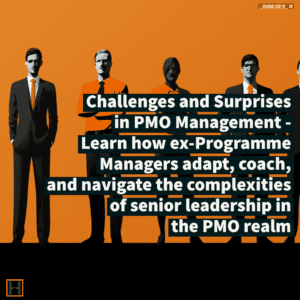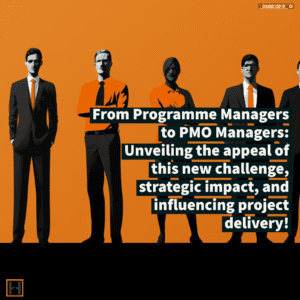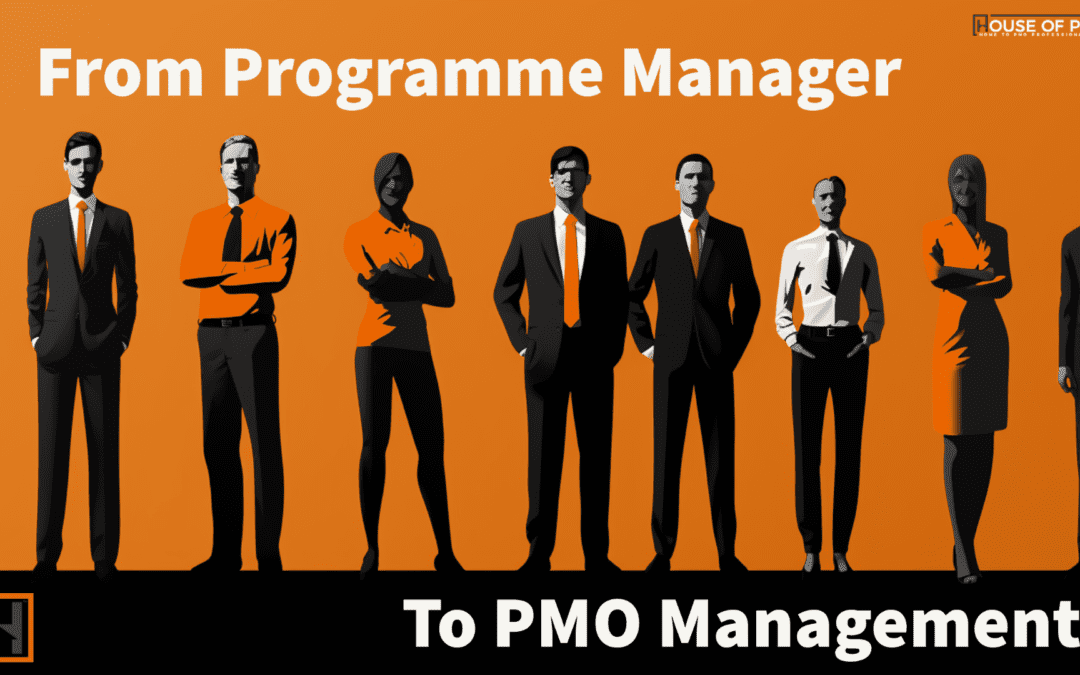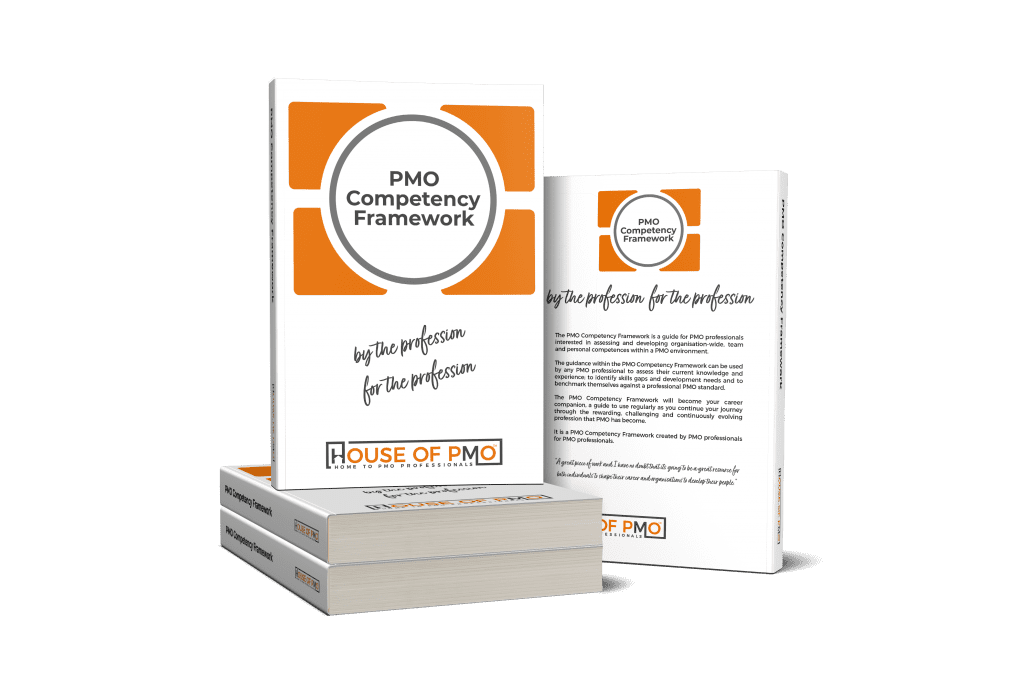This article explores the transition of professionals from delivery roles (Project Managers and Programme Managers) to PMO management positions. We delve into the career paths of five PMO Managers who previously worked as Programme Managers.
It is widely acknowledged that PMO – project, programme and portfolio management offices – in organisations today take on many different forms and functions. The high-level principle is that a PMO provides support to ensure an organisation’s change activity is delivered successfully.
How the PMO chooses to do that depends on different factors such as cost, capability, culture and organisational maturity. Leaders of the PMO drive the PMO’s vision, purpose, outputs and outcomes, typically PMO Managers and PMO Directors.
There has long been a debate within the PMO community about the ideal career path to the senior leadership role of PMOs. Is it better to have someone who has worked within PMO for several years without direct delivery experience or do professionals with delivery experience make the better candidates?
In this article, House of PMO wanted to understand more about the people who have chosen to work within PMO management roles having previously worked as – first Project Managers and then Programme Managers.
We talked to five different PMO Managers who had previously worked in delivery roles before taking the steps into a PMO leadership position. Each one of them had previously worked as Programme Managers.
Here we provide answers and insights from each of the questions and then provide an overall summary of the findings.
Appointment to PMO
We asked the question, “Who appointed you? Were you headhunted or did you apply for the role? In both cases why? What was the appeal? How was your experience relevant?”
In most cases the Programme Managers were “kind of” headhunted to take up the role of PMO Manager. What does that mean? There was a recognition that previous experience in programme and project management (PPM) would be useful in setting up a PMO from scratch.
It has long been advocated that once the vision for the PMO is set and sponsorship is gained, the setting up of a PMO should be done using good practice PPM techniques and approaches. All our interviewees had the PPM experience to offer.
Yet the starting point wasn’t as simple as seeing a job advertisement for a PMO Manager and applying for it. It was a mix of initially starting a new role as a Programme Manager and then quickly seeing that what the organisation really needed was a PMO (so a switch in requirements). It was going for an interview for a Programme Manager role and being offered the PMO role instead (the person fits the remit). In each case, the Programme Manager is not necessarily taking a proactive step or initiating a change in career.
What is the Appeal?
There were similarities in answers from all the interviewees.
- It was a new challenge
- It was the possibility of influencing the way projects and programmes are delivered in the organisation
- It was the opportunity to work at a more strategic level, getting closer to the business and being able to make a bigger impact.
Leaving the Past Behind?
We asked, “We know that the PMO Manager has multiple stakeholders – Execs, BAU, PMO team and the delivery teams – do you still feel more aligned to the delivery team?”
In most cases, no, the ex-Programme Managers didn’t feel more aligned to the delivery teams. Just because they had previously worked in delivery, this was their opportunity to focus on making changes for the wider good of all delivery in the organisation.
To do that, it is about understanding who the “client” or “customer” now is. Each one of these PMO Managers are operating at the portfolio, departmental or enterprise level. Their focus is not on the individual support level of projects and programmes – it is the senior management or board level who are their customers.
For some it is more about the strategic and investment decision-making support which has taken them a step removed from programme delivery. However, there was one stand out observation across a number of our interviewees – they do sometimes get “dragged back” into programme delivery.
Not Entirely Leaving the Past Behind
 There were different circumstances as to why a PMO Manager, with previous experience in programme delivery, will be asked to step back into the delivery role.
There were different circumstances as to why a PMO Manager, with previous experience in programme delivery, will be asked to step back into the delivery role.
One, it was an exceptional requirement, namely the pandemic, when all hands were needed in the business to pivot and deliver business critical change.
The second, in smaller businesses with resourcing issues where a lack of capability means stepping back in to get things done.
In both cases, it also means performing both roles at the same time, which of course comes with its own set of frustrations.
Which leads on to the next question.
Telling People What to Do
“How hard is it to stop ‘jumping in’ and telling the project manager / programme manager what to do (because of the experience you’ve had?)
In the early days of switching from a delivery role to a PMO role it can be difficult to not want to get involved at a granular level. In many cases, the PMO role is at a much higher level so its easier not to get involved at that granular level.
Over time, the mindset changes. You’re now the pit lane crew as opposed to the car driver – neither team can win race without each other so it is a case of working with each other – to understand what each team needs and making sure those needs are met.
The relationship with delivery managers changes to a balancing act of supporting and challenging – giving advice, carrying out crucial conversations, mentoring or coaching are the preferred ways of developing ongoing relationships.
Coaching is a Recurring Theme
With previous experience delivering programmes and projects themselves, the ex-Programme Managers have a level of experience which gives confidence when offering support through coaching (or mentoring) techniques and approaches.
There is often instant credibility there because not do they understand the role and the many challenges and situations to be navigated, they are able to empathise, they too have been there. Developing trust and creating connections is much quicker due to the shared experiences.
The Biggest Challenge
Stepping into a PMO role after many years of delivering programmes and projects can bring different challenges.
A smooth transition is possible, especially if you already have experience of working with a good PMO and understand how PMOs can make a real difference to the success rates of programmes and projects. Equally, having experience of working with PMOs that have made the wrong call or imposed badly thought through processes can also help too!
For many of the ex-Programme Managers, the biggest challenge tends to be around people – and the impacts of change. Changes in the way certain aspects of projects and programmes need to be delivered.
“Explaining that for good reasons there are just some things projects need to do differently. It is the most difficult because it has to land well and not become a barrier to delivery (real or perceived) – but on the other hand it was easier because I knew the impact when PMOs do it badly, so I was probably over collaborative”
Other challenges include making the changes required to start working at a more portfolio level, getting out of the weeds and becoming more involved in strategy execution. Change like that doesn’t happen overnight. There is a lot of work to continually connect the different types of people involved from delivery managers, their teams, sponsors and users – it really tests your leadership skills and the ability to adapt and flex.
The Surprising Parts of PMO
Everyone will have a different level of expectation when moving into a new role and for the ex-Programme Managers there were many things that took them by surprise when they moved into PMO management.
- How much power the PMO has when exercised with care
- The role being a trusted partner and everything that entails
- The PMO must do a lot of problem-solving – something that wasn’t appreciated when working on the “other side” in delivery
- The range of services that a PMO can offer
- There is a lot more career progression in PMO and the opportunity to get involved in diverse opportunities
- The frustration of “why don’t people just do it”
- There are a lot of poor-quality delivery managers in the organisation
- There is a lack of linkage between strategy and delivery
- There are many diverse ways of working
Additional Skills Needed
 With a few surprises in store after making the move into PMO management, we asked the ex-Programme Managers if they felt they needed to upskill in any areas in order to perform better in their new roles.
With a few surprises in store after making the move into PMO management, we asked the ex-Programme Managers if they felt they needed to upskill in any areas in order to perform better in their new roles.
An essential skill has been learning the language of the business. For many of these ex-Programme Managers, their PMOs are seen as the bridge or key translator between the business and PPM.
This has also led to more focus on their business networking skills and knowing what their key relationships are.
There has also been the need to understand what the best practices are in PMO and also portfolio management – the structures, the services, the roles – as well as setting the vision, objectives and key outcomes.
And mentioned previously, becoming a better coach and helping others adapt to change (change management was also mentioned as a key skill) has really made a difference to gaining trust and increasing levels of engagement with the PMO.
PMO to Delivery or Delivery to PMO
In times gone by, people started their career in PMO with the intention of eventually leaving and becoming Project and Programme Managers. PMOs were often seen as places which offered just secretarial, administrative support to projects and programmes.
Over the last decade or so, there has been a big shift which has seen the PMO become a “career of choice” and not a steppingstone into delivery roles.
Part of this change is due to the change in seniority and accountability of some PMOs – PMOs operating at an enterprise level or providing services at the portfolio management level. These PMOs – operating close to the C-level – have attracted more experienced senior managers with the opportunity of overseeing all change activity in the organisation.
Another reason why PMO has become a “career of choice” for many people is because of the diversity of opportunities available. Regardless of the level of role within the PMO it combines both the analytical and the people interactions. There are a number of different career paths that exist – from the generalist, the specialist, the manager and the leader.
Conclusion
This article explores the transition of professionals from delivery roles (Project Managers and Programme Managers) to PMO management positions. It highlights that PMOs, which encompass project, programme, and portfolio management offices, vary in structure and function within organisations. PMOs aim to support successful change initiatives, and their approach is influenced by factors such as cost, capability, culture, and organisational maturity. The vision, purpose, outputs, and outcomes of PMOs are determined by their leaders, typically PMO Managers and PMO Directors.
The article delves into the career paths of five PMO Managers who previously worked as Programme Managers. They were mostly approached for the PMO roles due to their experience in programme and project management, which is valuable in setting up PMOs effectively. The appeal of moving into PMO management for these professionals included the opportunity for a new challenge, the ability to influence project and programme delivery across the organisation, and the chance to work at a more strategic level with a broader impact on the business.
Despite their background in delivery roles, the ex-Programme Managers didn’t feel more aligned with the delivery teams in their PMO positions. They now cater to senior management and board levels, focusing on strategic and investment decision-making support.
The article also discusses the challenges faced by those transitioning to PMO roles, which involve managing changes in project and programme delivery approaches and aligning with strategic goals. Coaching and mentoring play a significant role for these ex-Programme Managers, given their experience in project delivery, and this helps build credibility and trust with their teams.
Some of the surprising aspects of PMO management mentioned include the extent of power the PMO can wield, the role as a trusted partner, and the wide range of services a PMO can offer. Upskilling in areas such as business language, networking, understanding best PMO practices, and change management has been essential for the successful performance of their new roles.
The article concludes by highlighting the shift in perception of PMO roles. In the past, PMOs were often seen as stepping stones into delivery roles, but they have now become “careers of choice” due to their seniority, accountability, and diverse opportunities available. PMOs at the enterprise or portfolio management level attract experienced senior managers who oversee all change activities in the organisation, combining analytical and people-centric interactions across various career paths within the PMO structure.
Many thanks to Catherine, Ian, Lois, Brad and Jonathan for taking the time to talk to the House of PMO for this article.
To find out more about the House of PMO and to keep in touch, visit the Membership options and join the PMO community today.



